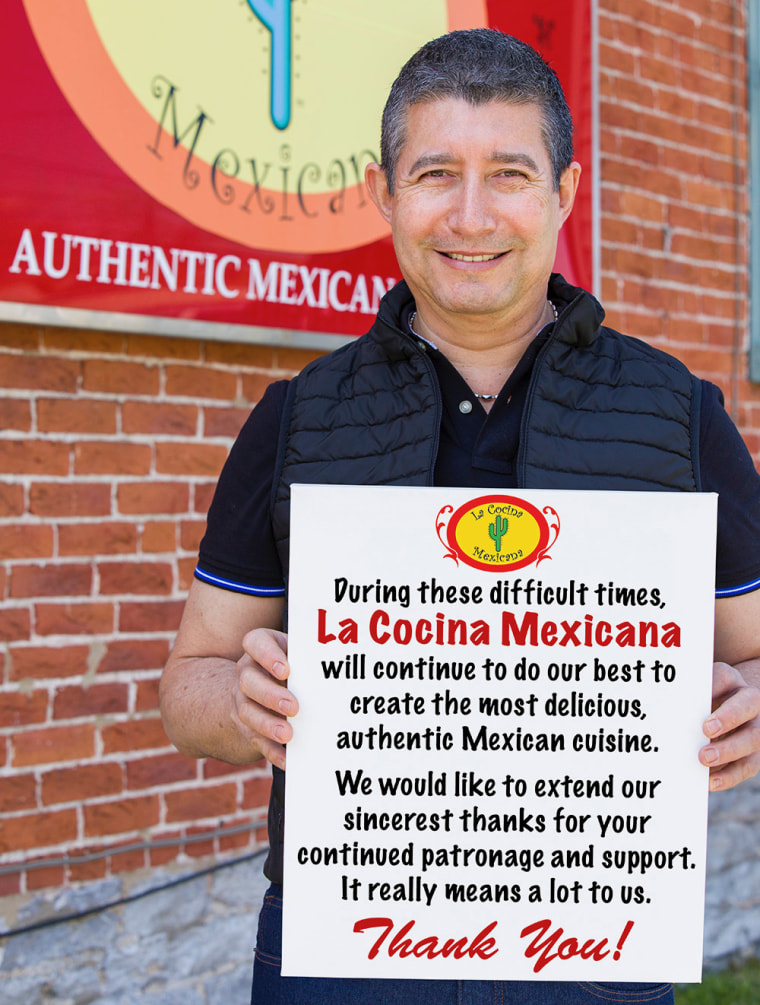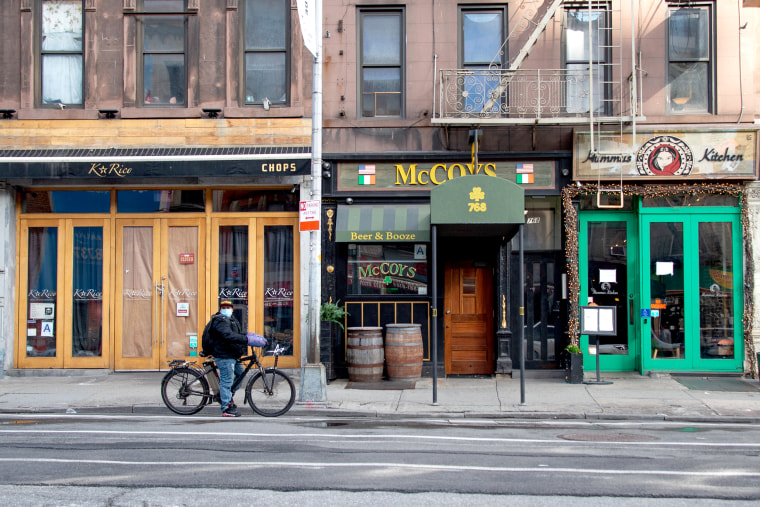Salvador Quintero had to look beyond traditional banks to get funding for the restaurant he started 20 years ago in Kutztown, Pennsylvania, money that has also allowed him to buy equipment and keep it running.
So when the coronavirus forced him to close up his dining room at La Cocina Mexicana restaurant and cut his employees’ hours, he went back to Community First Fund, the nonprofit Community Development Financial Institution (CDFI) that is his lender.
Community First Fund helped him apply for the loan “and I got it. It didn’t take long,” Quintero told NBC News.
“The banks, they always give me a hard time to obtain the money; the banks say they don’t lend to restaurants, they are high risk,” he said, adding they always "shut the door in my face.”
For a number of Latino and other minority business owners, larger traditional banks have never been an option for loans. A greater share of Latino business owners are unable to get financing compared to non-Latino, white-owned businesses, much like African American business owners, according to the Stanford Institute for Economic Policy Research.
A survey of more than 500 Latino small business owners showed just 97 of respondents who applied for loans got any money in the first round of PPP funding.

As Quintero did, many businesses owned by Latinos or other minorities and women secure loans through community lenders, often CDFIs or Minority Depository Institutions, certified by the Department of the Treasury to provide capital to underserved communities, minorities and people considered “underbanked”.
Despite the vital role these lenders play and the fact that Latino small businesses are driving U.S. small-business growth, the latest coronavirus bill failed to give such lenders a fair shot at the next round of loan money from the federal government, said Noel Poyo, executive director of the National Association for Latino Community Asset Builders, which raises capital and then loans it to its network of 120 community lenders.
The $484 billion relief package passed by Congress Thursday sets aside $30 billion for community lenders, but they must share that pie with small banks with assets of $10 billion or less — a category that includes 95 percent of the nation’s banks.
Another $30 billion was set aside for financial institutions with assets between $10 billion and $50 billion, for a total of $60 billion set aside to help small businesses.
Poyo said this still isn't enough to fix the problem created by the first relief package, which provided $350 billion in forgivable loans for small businesses but quickly ran out of money. The bulk of that money went to larger banks that gave priority to their established customers and that often don’t serve the customers that community lenders do.
“We’ve been calling for a substantial set-aside of funding to get money through to vulnerable and other small businesses,” said Poyo, who referred to the addition of small banks to the set-aside as a “hijacking."
Poyo said it was nearly impossible to ask supportive House members to amend the Senate bill when it reached them because that would have slowed down the relief package, which also contained money for coronavirus testing and hospitals. The House approved the bill 388-5-1.
Large banks had lobbied for a bigger role for CDFIs, said Poyo, "because they know they are not going to reach some of these populations." He said often CDFIs, before making loans, will send a client's application and information to a banking partner and ask whether the bank wants the loan "and the bank will say no thank you."
More than 1,000 institutions around the country are certified by the Treasury Department as CDFIs. Many of them are nonprofits focused on obtaining private and government investment to provide micro and small loans and other services to lower-income borrowers or for investment in "distressed" areas.
CDFIs have good repayment rates and the industry has grown.
Also in the mix are the Minority Depository Institutions, which are generally banks that rely on consumer deposits to make loans and where 51 percent of the stock is minority owned. MDIs generally have less than $10 billion in assets.
Poyo noted that the Senate had stated in the previous coronavirus relief bill that the Small Business Administration should issue guidelines to ensure lenders give priority to small businesses in underserved markets.
Poyo’s group called on Congress and the Treasury Department in a news release to make good on a that statement.
“For many who did not get access to the original PPP dollars, these additional funds could be the difference between resilience and economic ruin,” the National Association for Latino Community Asset Builders said in the release.
In several tweets, Sen. Marco Rubio, R-Fla., chairman of the Senate Committee on Small Business and Entrepreneurship, had called for such lenders to be involved in the disbursement of money from the Paycheck Protection Program.
As Congress negotiated the latest bill with the Trump administration, Rep. Joaquín Castro, D-Texas, chairman of the Congressional Hispanic Caucus, penned a letter to Secretary of the Treasury Steven Mnuchin and Small Business Administrator Jovita Carranza saying that forthcoming legislation should include provisions to ensure “substantial funding is channeled through community development institutions (CDFIs) ...” and that they be provided a $65 billion set-aside.
More than $1B in requests — and $30m to invest
Community lenders borrow money in order to disburse funds for loans. Goldman Sachs announced Monday it would loan $50 million to CDFIs in Texas to help them administer Paycheck Protection Program loans. Half of the money went to LiftFund, a CDFI based in San Antonio.
When the announcement was made, LiftFund opened its application process to ensure business owners could get applications in swiftly for the next round of the paycheck program funding, Janie Barrera, LiftFund president and CEO, said.
“We received more than $1 billion in requests, for which we only have $30 million to invest,” Barrera said. She said 46 percent of applications for coronavirus relief funds are from Latinos. LiftFund had loaned about $25 million to $30 million a year before the coronavirus crisis, with the average loan being about $24,000. Its portfolio is about 82 percent minority.
“I think this shows the deep need and it’s a wakeup call to our community that more needs to be done,” she said.
Rosa Rios Valdez, president and CEO of BCL of Texas, a CDFI in Austin and Dallas, said BCL was flooded with calls after she did a Spanish-language television interview about a week ago. Many of the calls are from Latinos who say their banks won’t process their loan requests or that their bank has cut them off.
“We heard from many, many banks that their existing customers were their priority and unfortunately a lot of the small entrepreneurs, the sole proprietors have been left out,” Rios Valdez said.
She said she was delighted to see the new money from Congress, even if she’ll have to compete with smaller banks for it.
"Happy" just keeping his employees
After getting the $20,000 Paycheck Protection Program loan he secured, Quintero returned workers to their full hours. The program's loans are forgivable if they were used for payroll. With that covered, the business Quintero still gets from loyal customers has allowed him to keep his restaurant running, even if it is reduced to takeout and delivery.
He has four employees, three of whom work full time. One has worked with him for 12 years, two others have been employees for 10 years each. Being able to make sure they keep working and can provide for their families was a relief.
“As long as I pay my bills, I don’t care that we are not making money and I want to be able to provide money to my employees," Quintero said. "I’m happy with that — I don’t want to lose my employees. I want to help them and I want to keep them.”
Follow NBC Latino on Facebook, Twitter and Instagram.


